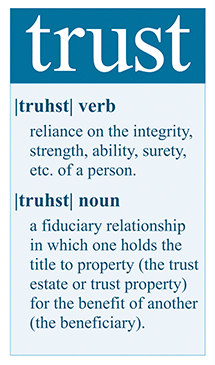Probate and Trust Administration by an Experienced Attorney
What is Probate?
Probate is a legal proceeding that is used to wind up a person's legal and financial affairs after death. The purpose of probate is to provide a means by which the decedent's property can be transferred to the beneficiaries of the decedent's estate. In California probate proceedings are conducted in the Superior Court for the county in which the decedent lived, and can take at least eight months and sometimes as long as several years.
Our goal in probate administration is to guide our client through the probate process as efficiently as possible. We represent our clients in the administration of an estate from the time of death until final accounting and settlement. We strive to conclude the probate administration as soon as possible and without unnecessary delay. Because of our whole-perspective approach to estate-related legal services, we can recognize early signs that conflicts may arise.
This office has represented clients in the probate process all over California. The first step in the probate process is by filing an administration proceeding in the Superior Court in the County where the decedent died.
The second major task in estate administration is to gather, inventory, and value the assets of the estate. These assets may include real estate, personal effects, insurance, bank accounts, stocks and bonds, and other investments. Unless these assets are valued at $100,000 or less, jointly owned or have a named beneficiary, they make up the probate estate, and it is from these assets that the debts of the person who has died and the administration expenses of the estate must be paid.
The third major task is for the executor or administrator to evaluate all claims made against the estate and pay legitimate debts. If there is a question about the validity of a creditor's claim, it may end up in a legal action to enforce the claim. Before the probate administration can be concluded, the executor or administrator must prepare a fiduciary accounting for the probate, unless a waiver of accounting is obtained.
Probate fees and fees to the executor or administrator are set by law. Probate fees on an estate with a gross worth of one million dollars ($1,000,000) would be $46,000: $23,000 for the executor or administrator and $23,000 for the attorney, computed as follows:
Fee Computation for Gross Estate Worth One Million Dollars
4% of first $100,000. $ 4,000.00
3% on next $100,000. 3,000.00
2% on next $800,000 16,000.00
Total $23,000.00 x 2= $46,000
This office is qualified to prepare a fiduciary accounting that will satisfy the legal requirements of the Superior Court. Further, this office assists the executor or administrator in making the necessary decisions about management of the estate and other estate issues that will need to be made before the final distribution of the estate.
What is Trust Administration?
It is important to have a knowledgeable and experienced attorney represent the trustee in the administration of a trust because trust administration is a complex and confusing area of the law. Our firm assists trustees in the management of trust property throughout the life of the trust. We also represent the trustee in the funding of trusts following the death of the first spouse.
In the most general sense, the legal counsel we provide in trust administration situations often relates to the definition and execution of the trustee’s "fiduciary duty." The trustee plays a fiduciary role with regard to the trust and the beneficiaries. This means that the trustee must handle the funds for the benefit of the beneficiaries with the same care as if the trustee was handling his or her own funds.
Common Trust Administration Questions
Some common trust administration questions relating to the execution of fiduciary duty are:
- What constitutes proper management?
- What constitutes responsible investment?
- How does one resolve a conflict between two generations of beneficiaries - when the older generation wants the income to be high, even at the expense of growth, but the second generation of beneficiaries wants the income low and the growth high?
- What is the definition of self-dealing and how may it be legally avoided?
- What types of actions must a fiduciary take to adequately investigate an independent investment adviser?
- How can the trustee be relieved from liability once the administration of the trust has been completed?
Trust Funding
After the death of the first spouse, our firm will help you with the next phase of trust administration - creating two or three trusts in which to transfer property. Determining whether to create an A, B or C trust, or a spousal, bypass or marital trust (commonly a QTIP trust) is complex, requiring the assistance of an attorney experienced in trust administration.
Our firm - with the assistance of appraisers and tax consultants - will advise you about what trusts to create and what property to transfer into them. We will help you deal with any income tax or accounting issues that may arise related to these newly created trusts.
When the second spouse passes away, we will help the new trustee interpret trust documents, understand his or her duties as a trustee and ensure that the trust is managed .
In addition, this office also handles the trustee’s duties associated with trust administration such as accounting, record keeping, the preparation of plans of distributions and payouts. We also advise and counsel beneficiaries as to their rights and responsibilities under the trust.

